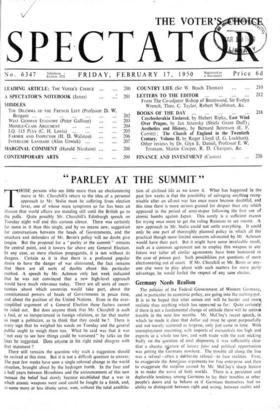" PARLEY AT THE SUMMIT "
THOSE persons who see little more than an electioneering move in Mr. Churchill's return to the- idea of a personal approach to Mr. Stalin must be suffering from election fever, one of whose main symptoms so far has been an illusion that world affairs are standing still until the British go to the polls. Quite possibly Mr. Churchill's Edinburgh speech on Tuesday night will end this curious silence. There was certainly far more in it than .this single, and by no means new, suggestion for conversations between the heads of Governments, and the attackers and defenders of Mr. Bevin's policy will no doubt give tongue. But the proposal for a " parley at the summit " remains the central point, and it towers far above any General Election. In any case, as mere election propaganda, it is not without its dangers. Certain as it is that there is a profound popular desire to have the danger of war eliminated, the fact remains that there are all sorts of doubts about this particular method. A speech by Mr. Acheson only last week indicated that he. was not convinced that a new high-level approach would have much relevance today. There are all sorts of uncer- tainties about which countries would take part, about the constitutional powers of heads of Governments in peace time, and about the position of the United Nations. Even in the over- simplified argument of - a General Election these factors cannot be ruled out. But does anyone think that Mr. Churchill is such a fool, or so inexperienced in foreign relations, or for that matter so inept a politician, as to think that they could be ? There is every sign that he weighed his words on Tuesday and the general public ought to weigh them too. What he said was that it was " not easy to see how things could be worsened" by talks on the lines he suggested. Does anyone in his right mind disagree with that statement ?
There still remains the question why such a suggestion should be revived at this time. But it is not a difficult question to answer. The past few weeks have seen a single colossal change in the world situation, brought about by the hydrogen bomb. In the four and a half years between Hiroshima and the announcement of this new menace the belief had slowly become established that a war in which atomic weapons were used could be fought to a finish, and, in some more or less idiotic sense, won, without the total annihila- tion of civilised life as we know it. What has happened In the past few weeks is that the possibility of salvaging anything recog- nisable after an all-out war has once more become doubtful, and this time there is more serious ground for despair than any which appeared in the period of semi-stupor following the first use of atomic bombs against Japan. This surely is a sufficient excuse for trying once more to get the ruling Russians to see reason. A new approach to Mr. Stalin could not settle everything. It could. only be one part of thoroughly planned policy in which all the' practical though more limited measures advocated by Mr. Acheson would have their part. But it might have some invaluable result, such as a common agreement not to employ this weapon in any future war (after all similar agreements have been honoured in the case of poison gas). Such possibilities put questions of mere electioneering out of court. If Mr. Churchill or Mr. Bevin or any- one else were to play about with such matters for mere party advantage, he would forfeit the respect of any sane elector.


































